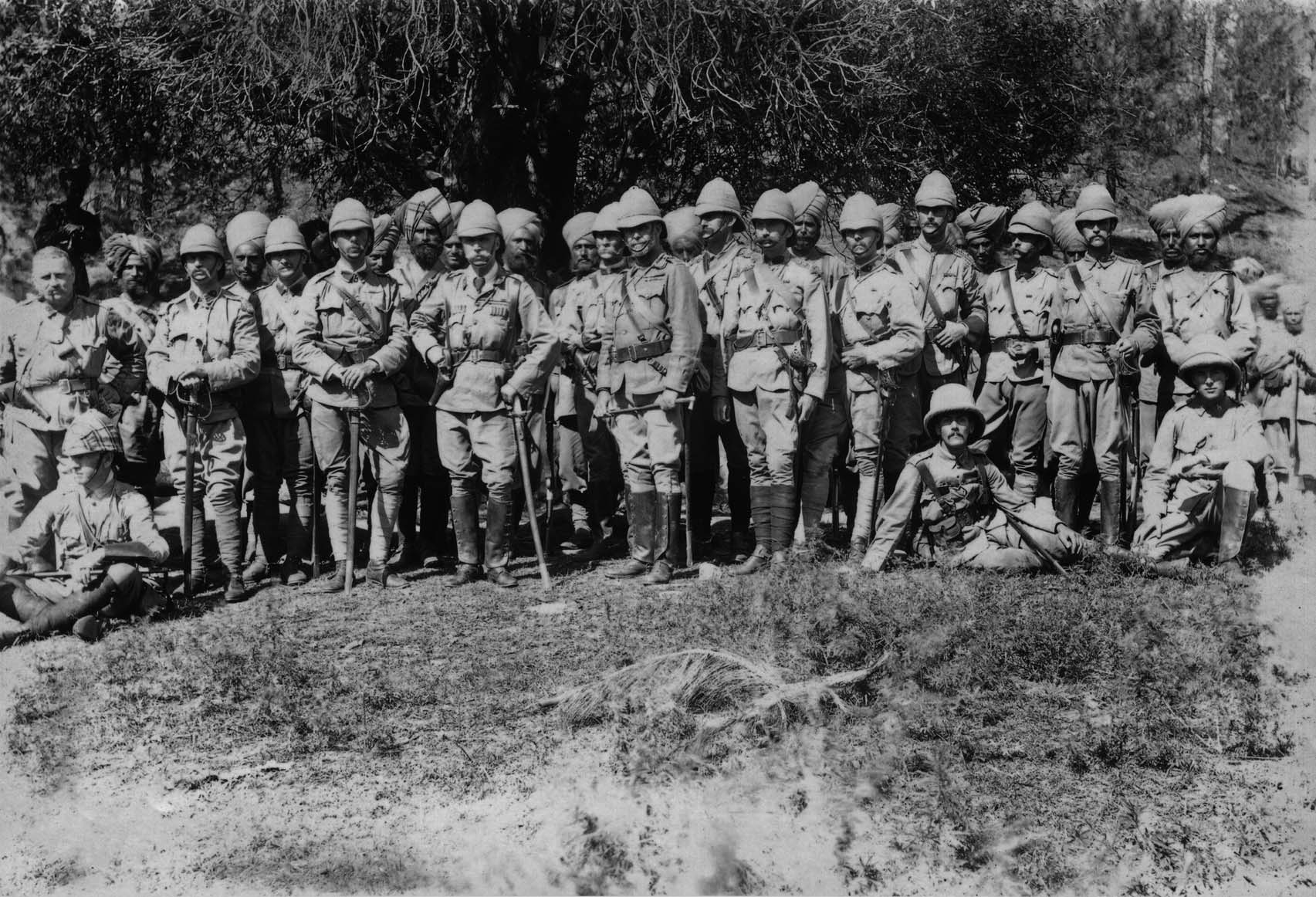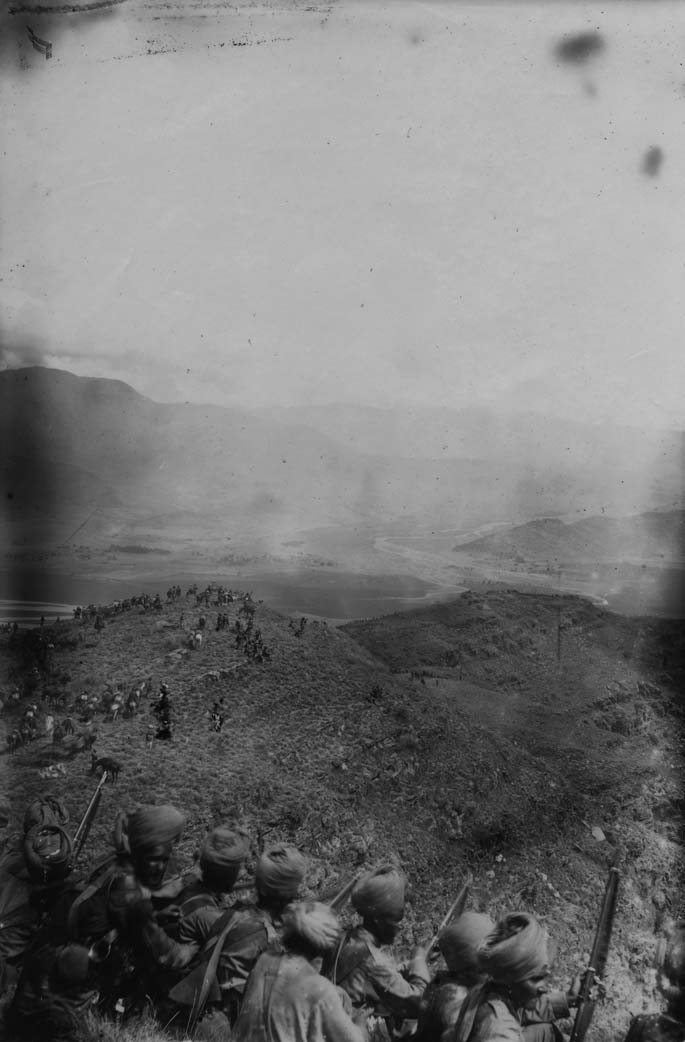By Con Coughlin
As America’s long decade of war in Afghanistan draws to a close in 2014 with the end of combat operations against the Taliban, it is perhaps worth reflecting on the conclusions the young Winston Churchill reached about the futility of waging war there. “Financially it is ruinous. Morally it is wicked. Militarily it is an open question, and politically it is a blunder.”
Churchill wrote these words in 1897 when, as a young cavalry officer, he found himself fighting the great-great- grandfathers of the modern Taliban movement. Churchill came very close to losing his own life during the six weeks he spent on the North-West Frontier, and his summary of the British effort in the 19th century eerily echoes the sentiments many American and British soldiers must now feel as they seek to wind down operations in Afghanistan.

Officers of the Malakand Field Force
General David Petraeus, the former head of the modern-day, American-led Nato mission to Afghanistan, and fellow officers such as General Stanley McChrystal drew heavily on Churchill’s account of his 1897 campaign, The Malakand Field Force, when they were drawing up the U.S. Army’s counter-insurgency manual for dealing with the Taliban.
Young Winston’s decision to volunteer for active service against the tribesmen was motivated as much by self-interest as his well-developed sense of adventure. As the son of an impoverished aristocratic family, whose father had died of syphilis two years previously, Churchill believed winning medals fighting the enemies of the British Empire was the perfect preparation for a career in politics.
From the outset he believed winning medals and decorations fighting for his country would enable him to “beat my sword into an iron Despatch Box”. It was the experience Churchill gleaned from fighting on the Afghan border, and later in Sudan, that helped him become Britain’s greatest wartime leader. And it is also from this period that we have one of Churchill’s most memorable quotes: “Nothing in life is so exhilarating as to be shot at without result.”
Certainly, with U.S. combat operations due to conclude by the end of 2014, the lessons of Churchill’s experience fighting the “wild, rifle-armed clansmen” on the Afghan border are as relevant for the U.S. today as they were for the British in the late nineteenth century.
By the time Churchill arrived to fight on the Afghan border as a second cavalry lieutenant in the British Army, Britain had already fought—and lost—two military campaigns in Afghanistan during the course of the nineteenth century. After these two humiliating defeats, attempts thereafter were made to distance British interests in India from the unruly Afghans, which included the establishment in 1895 of the Durand Line, the 1,500-mile long border that today marks the boundary between modern-day Pakistan and Afghanistan.

Native troops in position at Malakand Fort
But rather than keep the Afghans at bay, the arbitrary division of their ancient tribal lands only resulted in inciting a major revolt, in which a number of holy men— just as people like Mullah Omar have done today—played a key role in persuading the tribes to take up arms against the infidel Westerners.
In Churchill’s day, the great, great grandfathers of those who created the modern Taliban movement were not called Taliban, but were known as the Talib-ul-ilms, a motley collection of indigent holy men who lived off the goodwill and hospitality of the local Afghan tribes and preached insurrection against the British Empire.
To Churchill’s mind, these Talibs were, together with other local priestly figures such as the mullahs and fakirs, primarily responsible for the wretched condition of the local Afghan tribesfolk and their violent indisposition to foreign rule. Churchill viewed them “as degraded a race as any on the fringe of humanity: fierce as a tiger, but less cleanly; as dangerous, not so graceful”. He blamed the Talibs for the Afghans’ lamentable absence of civilised development, keeping them in the “grip of miserable superstition”. Churchill was particularly repelled by the Talibs’ loose moral conduct. They lived free at the expense of the people and, “more than this, they enjoy a sort of “droit du seigneur,” and no man’s wife or daughter is safe from them. Of some of their manners and morals it is impossible to write.”
In modern times the West has taken a similar view towards the Taliban, especially after the brutal reign of terror the movement imposed on the Afghan people during its brief spell in power before the September 11 attacks, when the national sports stadium in Kabul was regularly used to stage public executions after Friday prayers. Apart from fighting to overthrow the Taliban government and making sure Afghanistan is not used as a safe haven for terror groups like al-Qaeda, the Nato campaign has given much emphasis to other issues, such as upholding the rights of women.
But while the decade-long conflict has caused much bloodshed on both sides, the Taliban have proved remarkably resilient, which is hardly surprising when one considers that the battlefield on which modern troops are fighting is not that different from that where young Winston first made his mark as a military figure.
Indeed, many of the CIA’s drone strikes against Taliban targets in the tribal areas of northern Pakistan have taken place against the same tribes, villages and valleys where Churchill fought more than a century ago.
And it is for this reason that, as the West prepares to end its decade-long involvement in Afghanistan, it should make sure to heed the lessons of Churchill’s experience fighting against the Afghans if the same mistakes are not to be made. Despite all the efforts Britain made to subdue the Afghans, the local tribes reverted to their everyday customs the moment the infidel soldiers had withdrawn. And, with no prospect of a peace deal in sight with the Taliban before Western forces leave at the end of this year, there is every possibility that the Taliban could soon return to rule large tracts of the country the moment the foreign troops have left.
This is certainly the proposition advanced in the more recent National Intelligence Assessment that was published in Washington in late December 2013, which warned that the Taliban was planning to retake all the territory vacated by withdrawing American troops.
And if that were to happen, it would truly be a case of history simply repeating itself.
All images appear with permission from the publisher.
CON COUGHLIN is the executive foreign editor of The Daily Telegraph and a world-renowned expert on the Middle East. He is the critically-acclaimed author of several books including his latest, Churchill’s First War. He appears regularly on television and radio in the United States and the UK to comment on international security issues.
